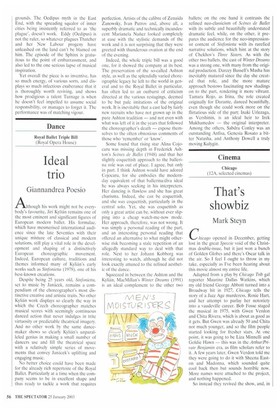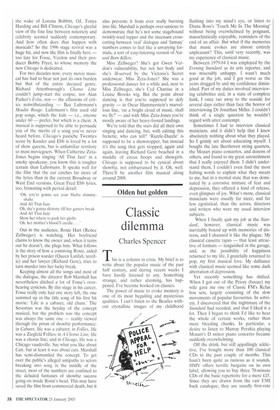That's showbiz
Mark Steyn
Chicago opened in December, getting lost in the great Speccie void of the Christmas double-issue, but it just won a bunch of Golden Globes and there's Oscar talk in the air. So I feel I ought to throw in my take, especially as I've been hearing about this movie almost my entire life.
Adapted from a play by Chicago Trib gal reporter Maurine Dallas Watkins, which my old friend George Abbott turned into a Broadway hit in 1927, Chicago tells the story of a Jazz Age murderess, Roxie Hart, and her attempt to parlay her notoriety into a vaudeville career. Bob Fosse staged the musical in 1975, with Gwen Verdon and Chita Rivera, which is about as good as it gets. But Gwen was already 50 and Chita not much younger, and so the film people started looking for fresher stars. At one point, it was going to be Liza Minnelli and Goldie Hawn — this was in the Arthur/Private Benjamin era, as film scholars refer to it. A few years later, Gwen Verdon told me they were going to do it with Sheena Easton and Madonna, which sounded quite cool back then but sounds horrible now. More names were attached to the project, and nothing happened.
So instead they revived the show, and, in the wake of Lorena Bobbitt, OJ, Tonya Harding and Bill Clinton, Chicago's gleeful view of the fine line between notoriety and celebrity seemed suddenly contemporary. And how often does that happen with musicals? So the 1996 stage revival was a huge hit, and now the film is finally here — too late for Fosse, Verdon and their producer Bobby Fryer, to whose memory the new Chicago is dedicated.
For two decades now, every movie musical has had to bear not just its own burden but that of the entire decayed genre. Richard Attenborough's Chorus Line couldn't jump-start the corpse, nor Alan Parker's Evita, nor — the effusions of critics notwithstanding — Baz Luhrmann's Moulin Rouge. Luhrmann's film used old pop songs, which the kids — i.e., anyone under 60 prefer, but which is a cheat. A musical is supposed to be able to persuade you of the merits of a song you've never heard before. Chicago's pastiche Twenties score by Kander and Ebb is loved by a lot of show queens, but is unfamiliar territory to most moviegoers. When Catherine ZetaJones begins singing All That Jazz' in a smoky speakeasy, you know this is tougher terrain than Luhrmann. It speaks well for the film that the ear catches far more of the lyrics than in the current Broadway or West End versions. Great Fred Ebb lyrics, too, brimming with period detail:
'Oh, you're gonna see your Sheba shimmy shake And All That Jazz Oh, she's gonna shimmy till her garters break And All That Jazz Show her where to park her girdle Oh, her mother's hlood'll curdle...'
Out in the audience, Roxie Hart (Renee Zellweger) is watching. Her boyfriend claims to know the owner and, when it turns out he doesn't, she plugs him. What follows is the story of how a conniving Roxie, aided by her prison warder (Queen Latifah, terrific) and her lawyer (Richard Gere), tries to turn murder into her lucky break.
Keeping almost all the songs and most of the dialogue, the director Rob Marshall has nevertheless ditched a lot of Fosse's overbearing cynicism. By this stage in his career, Fosse really only had one story left, the one summed up in the title song of his first hit movie: 'Life is a cabaret, old chum.' The Seventies was the heyday of the concept musical, but the problem was the concept was always the same one — reality viewed through the prism of showbiz performance: in Cabaret, life was a cabaret; in Follies, life was a Ziegfeld Follies; in A Chorus Line, life was a chorus line; and in Chicago, life was a Chicago vaudeville. Say what you like about Cats, but at least it was about cats. Marshall has semi-dismantled the concept. To get over the public's alleged antipathy to actors breaking into song in the middle of the street, most of the numbers are confined to the deluded fantasies of showbiz success going on inside Roxie's head. This may have saved the film from commercial death, but it
also prevents it from ever really bursting into life. Marshall is perhaps over-anxious to demonstrate that he's not some stagebound twinkly-toed tapper and the incessant crosscutting between 'real' dialogue and 'fantasy' numbers comes to feel like a unvarying formula, a sort of easy-listening version of Natural Born Killers.
Miss Zellweger? She's got Gwen Verdon's vulnerability, but not her body and she's ill-served by the Victoria's Secret underwear. Miss Zeta-Jones? She was a professional dancer for a while and, next to Miss Zellweger, she's Cyd Charisse in a Louise Brooks wig. But the point about dancing is that you're supposed to defy gravity — in Oscar Hammerstein's marvellous line, 'on a bright cloud of music, shall we fly?' — and with Miss Zeta-Jones you're mostly aware of her heavy-footed landings.
We're told that the stars did all their own singing and dancing, but, with editing this frenetic, who can tell? `Razzle-Dazzle' is supposed to be a showstopper, but instead it's the song that gets stopped, again and again, leaving Richard Gere beached in a muddle of circus hoops and showgirls. Chicago is supposed to be cynical about showbiz, not embarrassed by it. Oh, well. There'll be another film musical along around 2008.



















































































 Previous page
Previous page